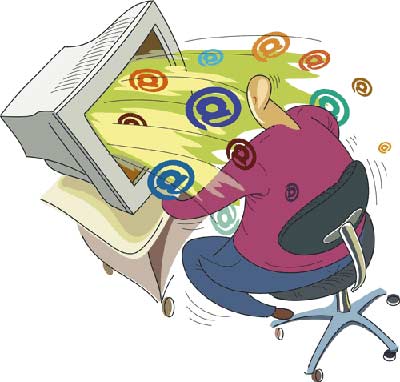电子邮件是一种便利、高效的现代通讯工具。表面上看,收发邮件轻而易举,但实际上它对个人的要求近乎苛刻:写邮件时你必须注意书信文体,收到邮件必须快速回复;为了避免不恰当的言辞,你还不能在眩晕、生气、疲倦或醉酒时写邮件。
By Sasha Issenberg
∷高檀 选注

In the early days of the inbox, it afforded the naïve human organism a certain pleasure to receive an email.[1] Ah,someone thinking of me... So a note or two of greetings whistled through the lonely day.[2] Thanks to email, the eloquence of a moribund letter-writing culture received a rejuvenating jolt of immediacy.[3] As late as the late 1990s and early 2000s, during the last days of dial-up, it still felt nice to send and receive the occasional squib, to play an epistolary game of catch with some friends.[4] Sometimes you would even forward a joke, a larky practice that nowadays seems an unconscionable crime.[5]
For it has lately become clear that nothing burdens a life like an email account. It’s the old story: the new efficient technology ends up costing far more time than it ever saves, because it breeds[6] new expectations of what a person can possibly do. So commuters[7] in their fast cars spend hours each day in slow traffic, and then at the office they read and send email.
Correct emailing practice does not exist. The true mood of the form is spontaneity, alacrity[8]—the right time to reply to a message is right away. But do that and your life is gone. So you reject the spontaneous spirit of email; you hold off[9] replying for hours, days, even weeks. By then the initiatory email has gone stale, and your reply is bound to be labored.[10] You compensate for the offence with a needlessly elaborate message.
You ask polite questions to which you pray there will never come an answer. Oh, but there will.
Of course you could always reply gruffly, and in lowercase.[11] Moreover, you could refuse to reply at all except where some practical matter was at issue. But Western civilization has always reserved for correspondence its most refined gestures of courtesy, and a memory of the old days persists.[12] Over email, you can be in touch with so many people—and make each one mad at you. And they are mad at you, your former friends, because no more
efficient vehicle for the transmission of rashness and spleen has ever been devised than the email.[13] Nettled by something—often something imaginary, since no one’s tone comes across quite right, over email—you lash out instantaneously.[14] You hit SEND and it’s too late. It’s too late because it’s too soon.
Email is good for one thing only: flirtation[15]. The problem with flirtation has always been that the nervousness you feel in front of the object of your infatuation deprives you of your wittiness.[16]
But with email you can spend an hour refining a casual sally.[17] The email, like the Petrarchan sonnet, is properly a seduction device.[18] But one has many correspondents, and few if any lovers. Individually, they’re all decent people; collectively, they form
an army marching to invade your isolation and ransack[19] your valuable time. Nietzsche declared that one should set aside an hour a week for reading letters; anything more was toxic.[20]
And now we read in the paper where Gloria Steinem[21] is complaining that she spends three hours a day replying to email. America, most efficient country on earth, is in fact a nightmare economy of squandered[22] time. Our economic system condemns people to[23] work in offices and send email; that’s what they do there. Then they go home and take with them all the work they were supposed to be doing all day.
We too have sometimes been the have-nots[24] in the email economy. In the role of supplicant emailer, we have labored to achieve the impossible right tone: so winning that others will have to write back,[25] so casual you can pretend it doesn’t matter when they don’t. The whole thing is painful all around. And this, finally, is what must be understood: email, which presents itself as a convenience, a breeze, is in fact a stern disciplinary phenomenon.[26] You must not stray[27] too far from your desk. You must be polite, you must write back soon. And yet in order to strike the right note, you must not write when too giddy,[28] angry, tired, or drunk. Always at the disposal of email, never, except guiltily, at the disposal of your moods...[29] It fits our phase of capitalism: the collective attitude is casual, natural-seeming, offhand; the discipline is constant and intense.[30]
For a while, email, in its efficiency, had seemed to serve very nicely the means of production and their owners. But lately, the business pages report a dialectical reversal whereby the means of communication overwhelm the means of production,[31] so that the class of owners and managers can hardly do or even supervise any work; they can only discuss,over email, the things they should be doing.
Western civilization has become a giant inbox; it will swell and groan but never be empty till it crashes.[32] Yes, it may be that all of us together, tapping out ephemera at our keyboards, will bring down this civilization once and for all.[33]
1. inbox: 收件箱;afford: 给予;naïve: 幼稚的;human organism: 人体组织。
2. 就这样,一两封简短的问候信在孤独的日子里嗖嗖传递着。
3. 多亏电子邮件,写信这种行将消失的文化行为,在生动流畅的基础上,又获得了一种直接性和即时性,从而突然变得焕然一新。
4. dial-up: 拨号上网,20世纪90年代刚有互联网的时候,拨号上网是一种较普遍的上网方式,进入21世纪,它又逐渐被其他方式所取代; squib: (幽默的)短文;epistolary: 用书信进行的。
5. forward: 转发;larky: 闹着玩的;unconscionable: 无礼的,过分的。
6. breed: 引起,造成。
7. commuter: 通勤者。
8. mood: 基调;spontaneity: 自发性,形容词为spontaneous;alacrity: 爽快,欣然。
9. hold off: 拖延。
10. go stale: 走味,变旧;labored: 不自然的,矫揉造作的。
11. gruffly: (态度)生硬地;in lowercase: 用小写字母,表示无关紧要的事情。
12. correspondence: 通信,correspondent指“通信者”;refined: 优雅的;
cour tesy: 谦恭,礼貌。这句话的意思是:通信者应该始终保持谦恭礼貌的态度,包括及时回信。
13. 他们——你以前的朋友们——很生你的气,因为没有什么工具设计得能比电子邮件更直接有效地传递你的轻率鲁莽和坏脾气。
14. 你被一些事情激怒后——常常是想象出来的事情,因为在电子邮件中,没有谁的语气能完全准确地传达——即刻予以猛烈回击。
15. flirtation: 调情,挑逗。
16. infatuation: 热恋,迷恋;wittiness: 机智,随机应变。
17. refine: 提炼(文字等),使(语言等)文雅;sally: 俏皮话,妙语。
18. Petrarchan sonnet: (彼特拉克推广的)彼特拉克体十四行诗,彼特拉克(1304—1374)是意大利诗人、欧洲人文主义运动的主要代表,著有爱情诗《抒情诗集》,他在这部十四行诗集中赞美了一个名叫劳拉的女子;seduction: 引诱,诱惑。
19. ransack: 掠夺,剥夺。
20. Nietzsche: 尼采(1844—1900),德国哲学家;toxic: 非常有害的。
21. Gloria Steinem: 格洛丽亚•斯泰纳姆,美国女权运动家、记者。
22. squander: 浪费,挥霍。
23. condemn sb. to: 迫使某人处于(不幸的状态或位置)。
24. have-nots: 穷人,贫民,此处指写电邮不是件容易的事。
25. supplicant: 恳求的;labor: 努力争取;winning: 有吸引力的,讨人喜欢的。
26. breeze: 轻而易举的事;stern: 苛刻的,严肃的;disciplinary: 纪律的,惩戒性的。
27. stray: 离开,游离。
28. strike the right note: 说得恰当;giddy: 晕眩的。
29. at the disposal of: 受……的支配;guiltily: 内疚地。
30. 这一点与我们所处的资本主义阶段相符:共有的姿态是随意、貌似自然、满不在乎;而要求却是始终存在、十分严格的。
31. business pages: 指商业报刊;dialectical: 辩证的;reversal: 逆转;overwhelm: 超过,此处指商家要耗费大量的时间于电子邮件的往来通信上。
32. 西方文明已然变成了一个巨大的“收件箱”;它将不断膨胀、负重累累,直至崩溃——这时方能全部清空。
33. 作者认为电子邮件耗时费力,如果人人都在收发邮件上投入过多的精力,人类文明必将面临巨大的灾难。ephemeral: 生命短暂的事物,指电子邮件。
(来源:英语学习杂志)